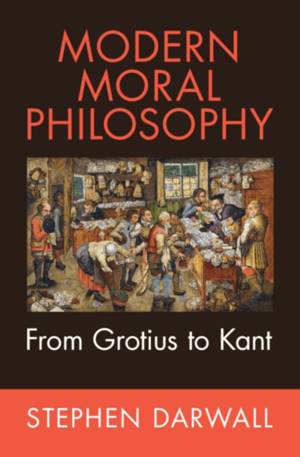
- Afhalen na 1 uur in een winkel met voorraad
- Gratis thuislevering in België vanaf € 30
- Ruim aanbod met 7 miljoen producten
- Afhalen na 1 uur in een winkel met voorraad
- Gratis thuislevering in België vanaf € 30
- Ruim aanbod met 7 miljoen producten
Zoeken
€ 57,95
+ 115 punten
Omschrijving
In this magisterial study, one of our leading moral philosophers refutes the charge (originally made by Elizabeth Anscombe) that modern ethics is incoherent because it essentially depends on theological and religious assumptions that it cannot acknowledge. Stephen Darwall's panoramic picture starts with the seventeenth-century thinker Grotius and tells the story continuously down to the time of Kant, exploring what was in fact a completely new way of doing ethics based on secular ideas of human psychology and universal accountability. He shows that thinkers from Grotius to Kant are profoundly united by this modern approach, and that it helped them to create a theory of natural human rights that remains of great political relevance today. He further shows that this new way of thinking provides conceptual resources that are far from exhausted, and that moral philosophy in this idiom still has a vibrant future.
Specificaties
Betrokkenen
- Auteur(s):
- Uitgeverij:
Inhoud
- Aantal bladzijden:
- 400
- Taal:
- Engels
Eigenschappen
- Productcode (EAN):
- 9780521860475
- Verschijningsdatum:
- 15/06/2023
- Uitvoering:
- Hardcover
- Formaat:
- Genaaid
- Afmetingen:
- 150 mm x 230 mm
- Gewicht:
- 635 g

Alleen bij Standaard Boekhandel
+ 115 punten op je klantenkaart van Standaard Boekhandel
Beoordelingen
We publiceren alleen reviews die voldoen aan de voorwaarden voor reviews. Bekijk onze voorwaarden voor reviews.








